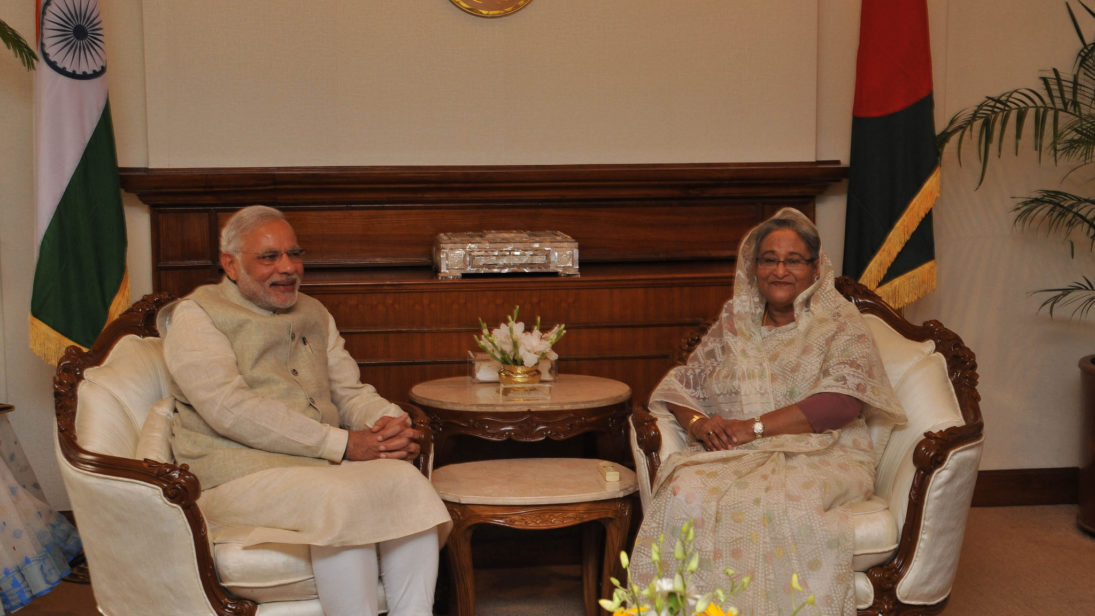
Later this week, Bangladesh Prime Minister Sheikh Hasina, one of India’s staunchest supporters in the region, will finally be making a state visit—her first since the Bharatiya Janata Party(BJP)-led National Democratic Alliance came to power in New Delhi in May 2014. In those three years, she has come to Delhi twice—in 2015, to attend the funeral of President Pranab Mukherjee’s wife, and then in 2016, to participate in the BRICS-Bay of Bengal Initiative for Multi-Sectoral Technical and Economic Cooperation (BIMSTEC) Outreach Summit. But a state visit seemed to have been inordinately delayed.
That Prime Minister Hasina has agreed to a state visit even though New Delhi has been unable to deliver the long-awaited water-sharing agreement on the Teesta river is noteworthy. In the India-Bangladesh context, this agreement could have served the purpose of a high-value deliverable—especially for Hasina who has invested enormous political capital in Bangladesh’s relationship with India. She would have rightly been expecting a deal on the Teesta in return. However, continued opposition from the state government in West Bengal has not allowed for any diplomatic progress to be made on this issue.
Hasina’s critics at home have often charged her with peddling an Indian agenda and failing to secure Bangladesh’s interests. The Teesta deal was supposed to be her comeback– her big diplomatic deliverable–but if that’s not going to materialize, then she will be seen as having returned empty-handed. In other words, Hasina is actually taking a significant political risk with this trip. The question then is: Why and why now? What are the other items on the agenda that could possibly counter-balance this risk? And what can India do to ease the pressure?
The answer lies in counter-terror cooperation. This has been one of the biggest achievements of the India-Bangladesh bilateral in recent years but as radical jihadi groups mount a renewed threat in this part of the subcontinent, it’s time for both countries to up the ante.
When Hasina and her Awami League government returned to power in 2009, they launched a nationwide crackdown on groups such as the Jamaat-ul-Mujahideen Bangladesh (JMB) and the Harkat-ul-Jihad-al-Islami Bangladesh (HuJI-B) that had been given a free hand by the previous administration of Khaleda Zia (which counted the insidious Jamaat-e-Islami amongst its allies). Hasina’s government also assured New Delhi that anti-India activities will not be tolerated on Bangladeshi soil. In keeping with her word, Hasina destroyed terror camps and went after militants from India’s northeast who had found sanctuary in Bangladesh.
But this was not all. When militants were flushed out of their safe havens in Bangladesh, many fled to India, particularly West Bengal. Here, the state government turned a blind eye to the jihadists as they regrouped and gained strength. The situation became worse after the Shahbagh movement in 2013 led to an outpouring of secular, progressive sentiment in Bangladesh—and in the process, galvanized extremist elements. Last year’s deadly Dhaka cafe blast was just one example of how the latter have been reactivated. Some have pledged allegiance to the Islamic State and Al Qaeda, adding yet another layer of complexity.
Across the border, in Bengal, Chief Minister Mamata Banerjee’s refusal to take on Islamist hardliners, even as general law and order in the state has deteriorated, has created a ticking bomb of its own. This became evident in 2014 when an accidental blast at a family home in Burdwan district exposed the JMB’s network in Bengal—as well as a plot to topple the Sheikh Hasina government. Since then, several links have been exposed between terror networks in West Bengal and Bangladesh and other transnational groups. For example, the Dhaka attack masterminds are known to have traveled around Bengal and met with at least one Islamic State sympathizer in Malda. Another suspect was recently arrested from Kolkata.
These developments have serious security implications for both India and Bangladesh as the Burdwan blasts in Bengal and the Dhaka café attack in Bangladesh stand proof. It will be interesting to see if and how they form the backdrop for a defense pact that may reportedly be signed during Hasina’s upcoming visit.
Understandably, much of the commentary about the defense pact has been focused on the Chinese angle—and how this is India’s response to China’s overtures to Bangladesh in particular and in the region in general. There has been a lot of talk about how Delhi has been worried about Dhaka’s purchase of two submarines from Beijing and is, therefore, seeking to strengthen its own defense relationship with Bangladesh. In Dhaka, the concerns are different. Some analysts worry that a defense deal with India will upset China while the opposition has claimed that this may not be in the best interests of Bangladesh.
But irrespective of the China factor, few will disagree that given the current security scenario, wherein local Islamist radicals connected to transnational groups have reared their ugly head, the deepening of military ties between Delhi and Dhaka is a necessity.
Editor’s note: This article is part of our two-part series on expectations from Bangladeshi Prime Minister Sheikh Hasina’s visit to India from April 7-10. Read the entire series here.
***
Image: Flickr, MEAphotogallery


